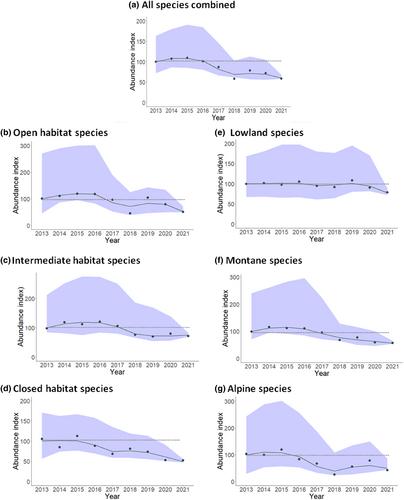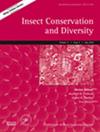South European mountain butterflies at a high risk from land abandonment and amplified effects of climate change
IF 3.2
2区 农林科学
Q1 ENTOMOLOGY
引用次数: 0
Abstract

南欧山地蝴蝶面临土地废弃和气候变化扩大影响的高风险
现有监测计划的数据表明,欧洲各地的蝴蝶正面临全球危机,栖息地丧失/退化、气候变化和化学污染是导致蝴蝶数量下降的主要原因。西欧现有的蝴蝶时间序列来自人口密集、相对平坦的地区。然而,在人口较少的地区,如欧洲南部的山脉,尽管这些地区是欧洲大陆蝴蝶生物多样性最高的地区之一,但对这些地区的种群趋势研究较少。在这里,我们分析了过去9年(2013-2021年)欧洲西南部山脉(Picos de Europa,西班牙西北部)的蝴蝶种群趋势,跨越了海拔梯度(80-2000米)。我们发现,这个100多年前被保护为国家公园的地区,仍然面临着巨大的威胁,蝴蝶丰度平均每年下降5.7%(过去9年累计下降45.7%)。高海拔地区的物种比低海拔地区的物种表现得更差,而中海拔地区(树线以下)的群落正朝着物种丰度更高的方向转变,并倾向于封闭的栖息地。山区气候变化的加剧和传统管理方式的放弃导致的栖息地丧失的综合影响似乎正在影响本研究区蝴蝶的个体物种和群落组成。
本文章由计算机程序翻译,如有差异,请以英文原文为准。
求助全文
约1分钟内获得全文
求助全文
来源期刊
CiteScore
7.70
自引率
8.60%
发文量
58
审稿时长
>12 weeks
期刊介绍:
To publish papers of the highest scientific quality within the general area of insect (and other arthropods) conservation and diversity covering topics ranging from ecological theory to practical management.
Papers are invited on the following topics: Conservation genetics; Extinction debt; Long-term conservation planning and implementation; Global implications of local or national conservation actions; Management responses of species and communities; Captive breeding programs; Comparisons of restored and natural habitats; Biogeography; Global biodiversity; Metapopulation dynamics; Climate change: impacts on distributions and range; Invasive species: impacts and control; Effects of pollution; Genetic threats to diversity by introgression; Effects of fragmentation on diversity and distribution; Impact of agricultural and forestry practices on biodiversity; Enhancing urban environments for diversity and protection; Biodiversity action plans: can we scale up from insects?; Effectiveness and choice of indicator species; Soil biodiversity and interactions with above-ground biodiversity; Ecological interactions at local levels; Ecological and evolutionary factors influencing diversity and local, regional and global scales; Sustainable livelihoods and training on the ground; Integrating science and policy.

 求助内容:
求助内容: 应助结果提醒方式:
应助结果提醒方式:


